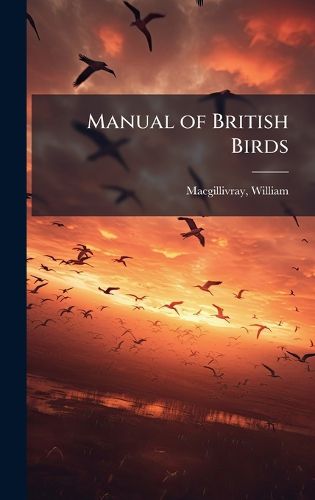Readings Newsletter
Become a Readings Member to make your shopping experience even easier.
Sign in or sign up for free!
You’re not far away from qualifying for FREE standard shipping within Australia
You’ve qualified for FREE standard shipping within Australia
The cart is loading…






"Manual of British Birds," by William Macgillivray, is a comprehensive guide to the bird species found in Britain. Originally published in 1846, this manual provides detailed descriptions and essential characteristics of various orders, families, genera, and species of birds. Macgillivray's meticulous observations and systematic approach make this book a valuable resource for ornithologists and nature enthusiasts.
This historical work offers insights into the state of ornithological knowledge during the 19th century. With its detailed accounts and systematic organization, "Manual of British Birds" remains a significant contribution to the field of natural history, providing a window into the avian life of Britain as it was understood nearly two centuries ago. The book serves as a useful reference for those interested in the history of ornithology and the study of British birds.
This work has been selected by scholars as being culturally important, and is part of the knowledge base of civilization as we know it. This work was reproduced from the original artifact, and remains as true to the original work as possible. Therefore, you will see the original copyright references, library stamps (as most of these works have been housed in our most important libraries around the world), and other notations in the work.
This work is in the public domain in the United States of America, and possibly other nations. Within the United States, you may freely copy and distribute this work, as no entity (individual or corporate) has a copyright on the body of the work.
As a reproduction of a historical artifact, this work may contain missing or blurred pages, poor pictures, errant marks, etc. Scholars believe, and we concur, that this work is important enough to be preserved, reproduced, and made generally available to the public. We appreciate your support of the preservation process, and thank you for being an important part of keeping this knowledge alive and relevant.
$9.00 standard shipping within Australia
FREE standard shipping within Australia for orders over $100.00
Express & International shipping calculated at checkout
"Manual of British Birds," by William Macgillivray, is a comprehensive guide to the bird species found in Britain. Originally published in 1846, this manual provides detailed descriptions and essential characteristics of various orders, families, genera, and species of birds. Macgillivray's meticulous observations and systematic approach make this book a valuable resource for ornithologists and nature enthusiasts.
This historical work offers insights into the state of ornithological knowledge during the 19th century. With its detailed accounts and systematic organization, "Manual of British Birds" remains a significant contribution to the field of natural history, providing a window into the avian life of Britain as it was understood nearly two centuries ago. The book serves as a useful reference for those interested in the history of ornithology and the study of British birds.
This work has been selected by scholars as being culturally important, and is part of the knowledge base of civilization as we know it. This work was reproduced from the original artifact, and remains as true to the original work as possible. Therefore, you will see the original copyright references, library stamps (as most of these works have been housed in our most important libraries around the world), and other notations in the work.
This work is in the public domain in the United States of America, and possibly other nations. Within the United States, you may freely copy and distribute this work, as no entity (individual or corporate) has a copyright on the body of the work.
As a reproduction of a historical artifact, this work may contain missing or blurred pages, poor pictures, errant marks, etc. Scholars believe, and we concur, that this work is important enough to be preserved, reproduced, and made generally available to the public. We appreciate your support of the preservation process, and thank you for being an important part of keeping this knowledge alive and relevant.